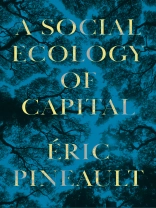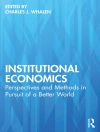An original theory of contemporary capitalist growth and its socio-ecological contradictions
‘A timely and urgent analysis which seeks to comprehend our ecological plight through an elucidation of monopoly capital’ – Gareth Dale, Reader in Political Economy, Brunel University
Capital is pushing into motion ever larger global material flows. In doing so it has come to depend on massive expenditures of energy, putting to work fossil fuels and the machines they animate to transform the world, accumulate power and grow the economy. The ecological relations and crises of today’s societies are driven by the processes of extraction of the elements that come together as a throughput of material and energy flows controlled by capital and shaped by its imperative of valorization.
In A Social Ecology of Capital, Éric Pineault proposes an original model of the fossil social metabolism that has sustained the growth of advanced capitalism in the last century.
Drawing on ecological economics and critical political economy, the book analyses how the social structures of accumulation, production, consumption and waste determine and regulate the material flow and the accumulation of material artifacts. Showing how social relations shape the ecology of capital, the book highlights the contradictions humanity now faces.
Cuprins
Introduction
1. The Material Flow
2. Nature’s Work: The Ecology of the Material Flow
3. Metabolic Regimes in a Historical Perspective
4. Fossil Based Industrial Metabolism
5. On Capitalist Metabolism
6. Accumulation and Social Metabolism in the Great Capitalist Acceleration
Conclusion: Emancipation amid the Ruins of Fossil Metabolism
Despre autor
Éric Pineault is a Professor in the Department of Sociology and the Institute of Environmental Sciences at the Université du Québec à Montréal. His research focuses on financial institutions, extractive economies, the issue of ecological transition and degrowth as well as the general macroeconomic and social transformations of advanced capitalism.












